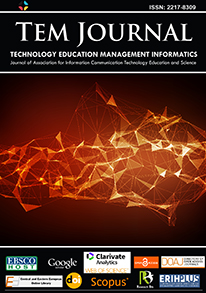A Research on the Application of Modern Information Technologies in Teaching
A Research on the Application of Modern Information Technologies in Teaching
Author(s): Radoslava TopalskaSubject(s): Education, Information Architecture, Electronic information storage and retrieval, Education and training
Published by: UIKTEN - Association for Information Communication Technology Education and Science
Keywords: Modern technologies; information technologies; educational technologies
Summary/Abstract: This paper examines the use of modern information technologies in Bulgarian pre-school and primary education, focusing on teachers' knowledge and use of technologies and the challenges they face. The study is based on an extensive literature review, which highlights the potential of modern information technologies such as programmable devices, virtual reality (VR) and augmented reality (AR) to improve the quality of education, student engagement and continuous learning. However, the research also identifies persistent barriers to their implementation, including insufficient resources, limited training opportunities and teacher resistance to technological change. The main objective of the study is to assess the level of knowledge and use of technologies among Bulgarian teachers, with a focus on identifying the main barriers to their effective integration into educational practice. The preliminary hypothesis suggests that despite the recognition of the potential benefits of technologies, their use remains limited due to institutional and personal factors. Methodologically, the study used a descriptive survey approach with 205 participants, including pre-school and primary school teachers, principals and education administrators. Data was collected using an online survey platform included in Microsoft Office 365. Key findings show varying levels of knowledge and use of modern technologies among teachers. Although a significant proportion of respondents use technology in their teaching, the level of adoption of more advanced technologies such as programmable devices, VR and AR is significantly lower. Teachers expressed a strong desire for additional information and training on modern technologies, highlighting their potential to enrich learning experiences in a variety of subjects. The study has important implications for the Bulgarian education system. It highlights the gap between the recognised potential of technologies and their practical application in the classroom. Addressing the identified barriers through targeted investment in resources, comprehensive professional development programmes and ongoing support for teachers is crucial. By overcoming these barriers, educational institutions can better prepare students for the challenges of the digital age, improve learning outcomes and create a more dynamic and effective educational environment.
Journal: TEM Journal
- Issue Year: 13/2024
- Issue No: 3
- Page Range: 1989-1996
- Page Count: 8
- Language: English

